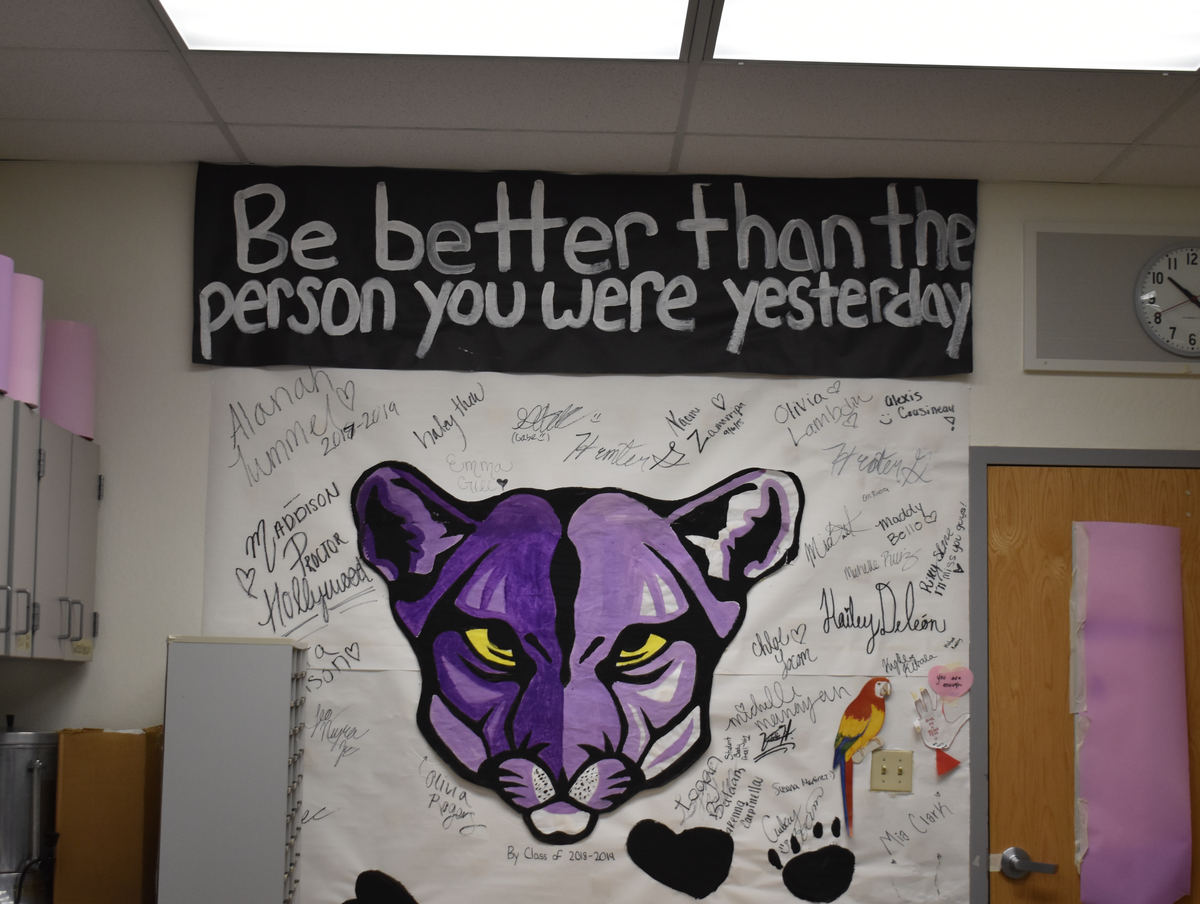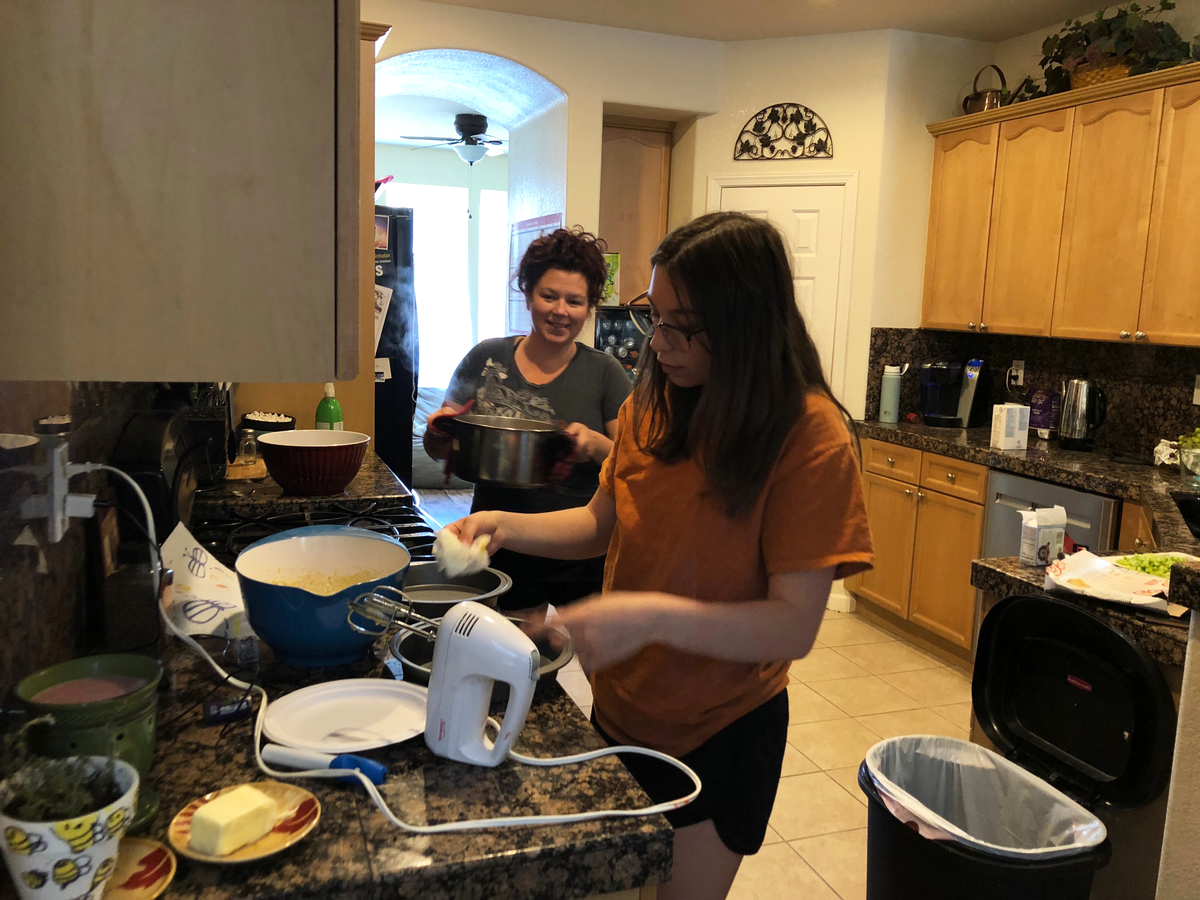Karina Gonzalez has been examining bullying and its impacts on mental health in the Washoe County School District.
As a warning, this story includes conversation about bullying and suicide. If you or someone you know may be considering suicide, contact the National Suicide Prevention Lifeline at 1-800-273-8255 (En Español: 1-888-628-9454; Deaf and Hard of Hearing: 1-800-799-4889) or the Crisis Text Line by texting HOME to 741741.
Riley Slane is a senior a Spanish Springs High School and a member of the school’s student leadership class.
“Being in leadership has made high school easy for me because I have a support system at school. Like, we are a giant family,” said Riley.

Being involved in leadership has helped Riley through high school. She describes her class as a family. CREDIT KARINA GONZALEZ
It’s a space where Riley feels comfortable and has a sense of belonging. She’s the class historian and takes pictures of her peers at school events.
Riley is involved on campus, even though it hasn’t always been easy for her. She grapples with anxiety and depression, but her mental health struggles started in middle school, where she was frequently bullied.
I would dread waking up and going to school,” said Riley. “They’d, like, oink at me in the hallway. They would chant in their group, like ‘piggy, piggy, piggy.’ They would tape pictures of pigs on my locker [and] put ‘kill yourself’ notes in my locker. It was terrible.”
Riley even recalls an Instagram account was made just for students to make fun of her. This made Riley leave school for a two-month period, taking classes online.
According to the CDC, reports of bullying are highest for middle schools, where 22 percent of students are bullied, compared to 15 percent in high schools.
Early last year, the state implemented a program called SafeVoice, a resource where students, parents and school faculty throughout Nevada can report anything that threatens the safety and wellbeing of students. Reports can be made via the website, hotline or app.

Inside the poster-making room hangs a motivational poster made by the leadership class. CREDIT KARINA GONZALEZ
Specifically, more than 1,700 bullying tips were reported to SafeVoice within the 2018-2019 school year.
The top reports in Nevada schools the past year were bullying, suicide threats and threats to schools, including planned attacks, according to the state’s Office of Safe and Respectful Learning.
However, the program wasn’t in place when Riley was in middle school.
Riley and her mother complained to the school about the bullying, and they were told that Riley should delete social media or just ignore it.
“You can’t ignore someone yelling at you across the hallway or seeing your face getting posted on Instagram,” said Riley. “Like, with mean comments, that’s impossible to ignore.”
According to the CDC, children are more likely to develop anxiety and depression after they have experienced situations of trauma, maltreatment, and bullying.

Riley cuts out purple stars to paste on her peers’ campaign poster. CREDIT KARINA GONZALEZ
Though Riley has not been bullied in the last few years, she still struggles with her mental health. In January, she attempted suicide.
“It was all just, it was mainly my, like, self-esteem. I still go through, like, I still look in the mirror and see, like, that fat girl I saw in middle school, and that is tolling,” said Riley.
Riley’s mother, Katie Soos, looks back on Riley’s bullying experience.
“To be honest, think it didn’t hit me entirely until after the fact, looking back on it,” said Soos. “But it would break my heart. I know that it’s weighed heavy on her.”

Riley and her mom Katie Soos prepare food for their family Father’s Day camping trip. CREDIT KARINA GONZALEZ
Soos also reflects on her own junior high experience.
I remember being in junior high and having a confrontation, someone said something stupid at school and then going home and just being worried about it,” said Soos. “But, to come home with a phone and a device – Snapchat, and this and that – having it thrown in your face until you go back to school the next day, it’s sickening to me and I don’t know how to fix it.”
Under current Nevada anti-bullying laws, school staff are required to report bullying the day the incident occurred. The school must first make sure the child is safe, then immediately start the investigation process. Students and parents directly involved are also notified the day the report is made. The school principal and administration must have the investigation completed within two days. But, earlier this year, the state legislature amended the law, giving schools five days for cyberbullying investigations.
“I feel like that sometimes a prompt investigation is not always a proper investigation. Some instances are pretty simple and they certainly should and could be completed in two days,” said Gina Session, the director of civil rights compliance for the Washoe County School District. “But, when we have more complex matters, particularly matters involving race or sex discrimination or harassment, it makes sense for us to take more time to complete those investigations.”
Once an investigation is complete, if parents are dissatisfied with the school’s decision, they can choose to appeal through the district or the Nevada Department of Education.
According to Session, cyberbullying cases are complex to investigate.
Investigators have to make credibility determinations,” she said. “‘Who’s telling the truth? What testimony supports what side of the story?’ Because you might get two very dramatically different sides of the story and it’s clear that somebody is not being truthful, and these are very complicated investigative kinds of problems.”
The state also requires districts to have school safety teams. These teams include principals, teachers, counselors, psychologists, social workers, deans or other specialized staff. The student-to-counselor ratio for high schools in the district is 400 to one.
“Yes, there’s a shortage of resources and it’s a shortage of resources not just in our school, but it’s a shortage of resources in our community, especially up here in the North,” said Katherine Loudon, coordinator for counseling and social work for Washoe schools.
Loudon explained that school counselors connect students to mental health resources in the community because of the heavy caseload school counselors already have.
“Their teachers, in general, don’t receive enough training in that area either, so it may be something hard for them to talk about because they may not have had the level of training,” said Loudon. “There’s some training that we do and that we offer, but maybe they don’t feel like they’ve had enough.”
Nevada is ranked 51st in the nation for access to mental health care.
Some notable bills did come out of the state legislature to work towards improving mental health care access and increasing funding in schools. Still, Riley and her mom hope to see more done about bullying in the future.
“I just wish people felt comfortable to come forward. I mean, I’m lucky that I have a good relationship with Riley. I imagine, some kids don’t have that and they might be apprehensive,” said Soos. “Make it, maybe, more of a group counseling sort of thing, like ‘Hey, let’s all meet at lunch and talk about this.’ It’s not going to make it go away, but if you have more people on the front line standing up to it, maybe it would happen less.”
Karina is a recent graduate from the Reynolds School of Journalism and contributed this story as part of our collaboration with KUNR.
